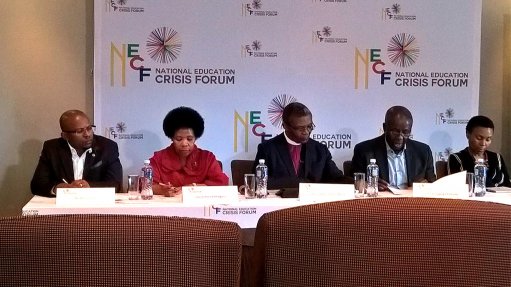
Civil society platform the National Education Crisis Forum believes that a higher education national convention will help tackle the problems at the country’s universities as they prepare to open their doors next month.
The Forum consists of a panel of individuals, convened by former Deputy Chief Justice, Dikgang Moseneke and nine co-convenors from various backgrounds. The forum members include Nelson Mandela Foundation CEO Sello Hatang, Advocate Yvonne Mokgoro, Bishop Malusi Mpumlwana, Professor Marry Metcalfe, Santie Botha, Jay Naidoo, Archbishop Thabo Makgoba and Professor Pitika Ntuli.
The Forum hopes to provide all affected parties in the current tertiary education crisis with a platform for dialogue and assist in facilitating engagements towards sustainable policy outcomes.
The higher education national convention is expected to be held on March 25 and 26.
The issues to be discussed at the convention include a higher education funding model, a peace and mediation framework, transformation, higher education access and massification, student accommodation and policy and legislation amendments.
Addressing the media at the Nelson Mandela Foundation in Johannesburg on Thursday Moseneke said civil society had a role to play in ensuring that the higher education crisis was tackled peacefully with all the relevant stakeholders.
These include the Forum’s partners, such as the Higher Education Parents Dialogue and the South African Council of Churches.
“South Africa is on the cusp of a systemic crisis in education. The education crisis affects all levels of education in South Africa – from early childhood development through to tertiary education – and reflects a societal problem produced by policy choices made over various epochs in South African history, including the apartheid and post-apartheid eras," said Moseneke.
The Forum, in preparation for the convention, is considering the development of work streams with a view to draft discussion documents which would be distributed in the build-up to the convention.
Moseneke further added that Forum partners were planning to develop provincial engagements at which the work streams would receive further consideration.
He said after all the efforts undertaken to help tackle the higher education crisis it was important to remember that only the State could fund higher education.
“In the meantime, we have to persuade young people that there is something to talk about,” he stated.
Representing the Higher Education Parents Dialogue, Irvin Phenyane said the major threat that the movement advocating that higher education fees should fall or that education should be ‘free’ was faced with was that the students on behalf of whom they were advocating were not uniform in terms of financial background or indeed other salient respects.
He said the students needed to realise that discussions needed to take place and that it could take longer than expected to find solutions.
for more information on the formu's work go to www.necforum.org